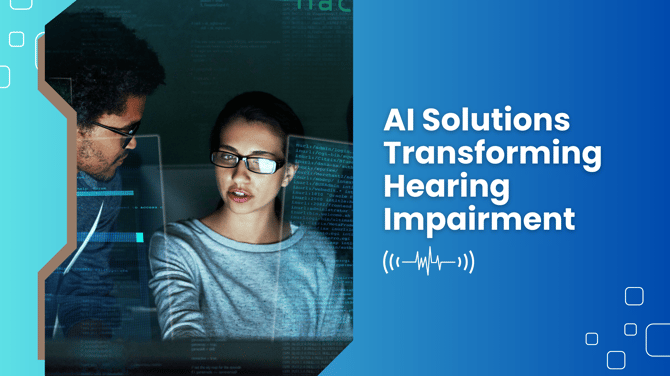Innovative AI Solutions Transforming Hearing Impairment
Discover how AI empowers the hearing-impaired community through innovative communication solutions and accessibility tools.

In the ever-changing world of technology, artificial intelligence (AI) is shining brightly as a beacon of hope and innovation.
The applications of Artificial Intelligence (AI) have become integral to diverse sectors, revolutionizing how we approach problem-solving, decision-making, and automation. From optimizing business processes to advancing healthcare diagnostics, AI's versatile capabilities continue to reshape our world, offering unprecedented opportunities for innovation and efficiency.
It is opening doors to new possibilities that can greatly enhance the lives of people with hearing impairments.
From breaking down communication barriers to fostering inclusivity, AI is making a profound impact on the hearing-impaired community. Let's take a closer look at some of the fascinating ways AI is transforming their world.
Breaking Down Communication Barriers
AI has numerous applications; one of the most significant ways AI is helping people with hearing impairments is by breaking down communication barriers. AI-powered devices such as hearing aids and cochlear implants can amplify sound and make it easier for people to hear.
AI solutions are also being used to develop new forms of communication, such as sign language translation and lip-reading software. This is helping to make communication more accessible and inclusive for people with hearing impairments.
Leverage State-of-the-art Custom AI Services
We offer end-to-end AI development solutions to help you build an innovative solution!
Fostering Inclusivity
AI is also helping to foster inclusivity for people with hearing impairments. For example, AI-powered captioning services can make it easier for people to participate in meetings and events. AI is also being used to develop new educational resources for people with hearing impairments. This is helping to ensure that people with hearing impairments have the same opportunities as everyone else.
Unleashing New Avenues of Independence
Beyond communication, AI is paving the way for greater independence among individuals with hearing impairments. Smart home technology, integrated with AI, allows for seamless control of various devices through voice commands or intuitive gestures.
This newfound autonomy extends to everyday tasks like adjusting the thermostat, turning on lights, or even making phone calls, giving people with hearing impairments more agency over their environments.
Enhancing Auditory Experiences
AI doesn't just focus on bridging gaps in communication; it's also enhancing auditory experiences for the hearing impaired. Advanced sound recognition algorithms can analyze environmental sounds, such as alarms, doorbells, or sirens, and send real-time alerts to a person's connected device. This heightened awareness contributes to personal safety and a deeper engagement with the surrounding world.
Revolutionizing Assistive Learning
You are absolutely right. AI is having a major impact on education, and it is especially beneficial for students with hearing impairments. Here are some of the ways that AI is being used to help students with hearing impairments learn:
- Real-time Captioning: AI-powered real-time captioning can help students follow lectures and discussions, even in noisy environments. This can be especially helpful for students who are deaf or hard of hearing, as it allows them to fully participate in class without having to rely on lip reading or interpreters.
- Speech-to-Text: AI-powered speech-to-text can help students transcribe audio recordings of lectures, textbooks, and other materials. This can be a valuable tool for students who need help taking notes or understanding complex concepts.
- Virtual Tutors: AI-powered virtual tutors can provide personalized instruction and feedback to students with hearing impairments. This can help students learn at their own pace and get the support they need to succeed.
In Conclusion:
As the realm of artificial intelligence continues to evolve, its impact on the hearing-impaired community grows increasingly profound. From dismantling communication barriers to fostering inclusivity, enhancing independence, and revolutionizing education and healthcare, AI is ushering in an era of empowerment and transformation.
As we look ahead, the continued integration of AI into the lives of those with hearing impairments promises a world where the phrase "impossible" fades into the background, replaced by a future of boundless possibilities and inclusiveness.














